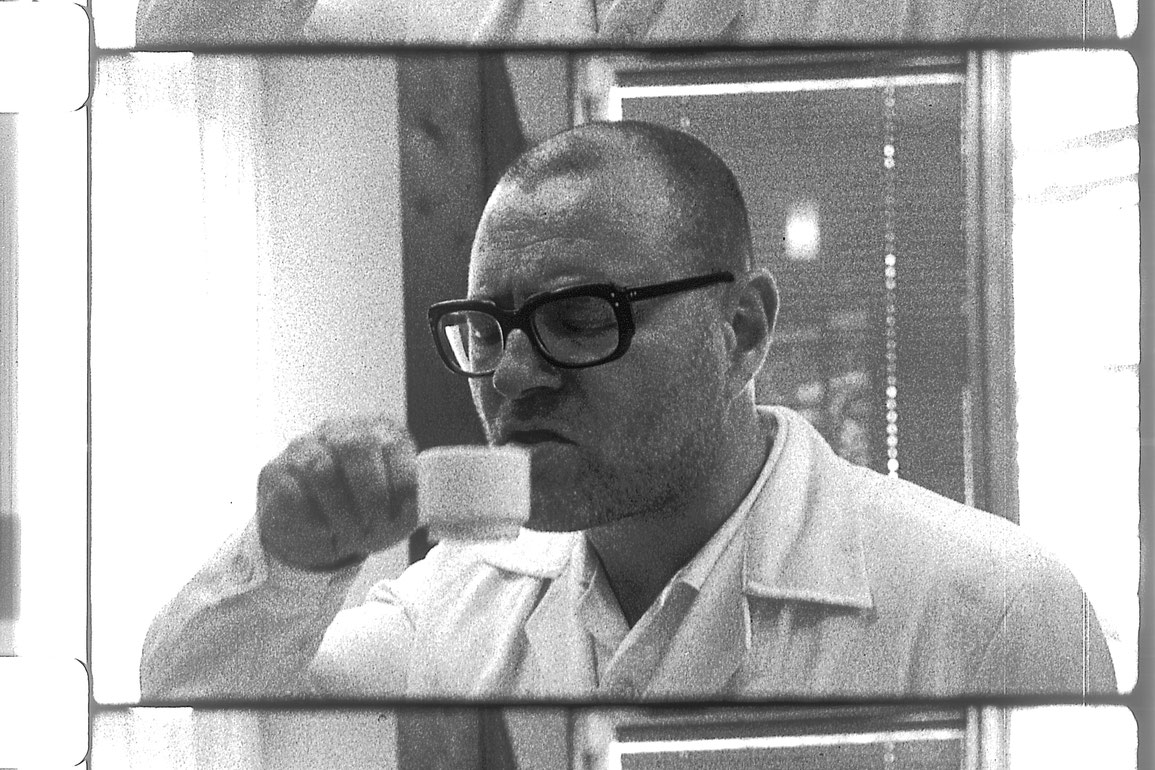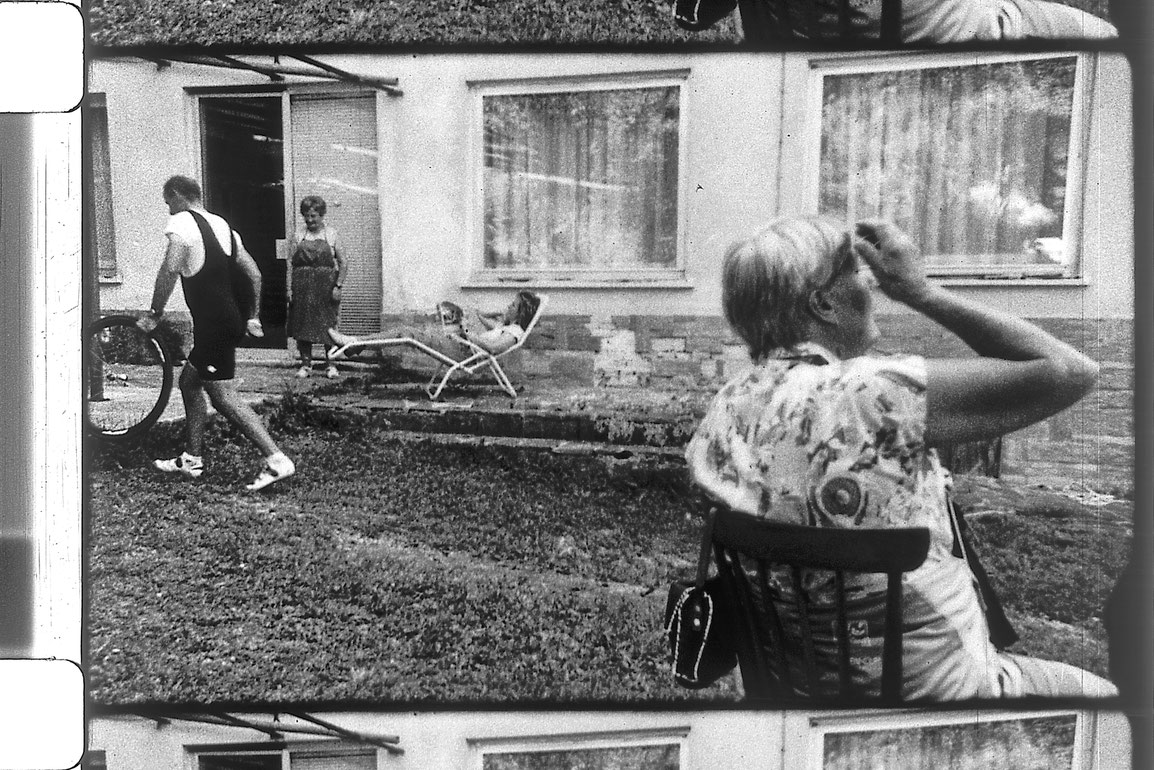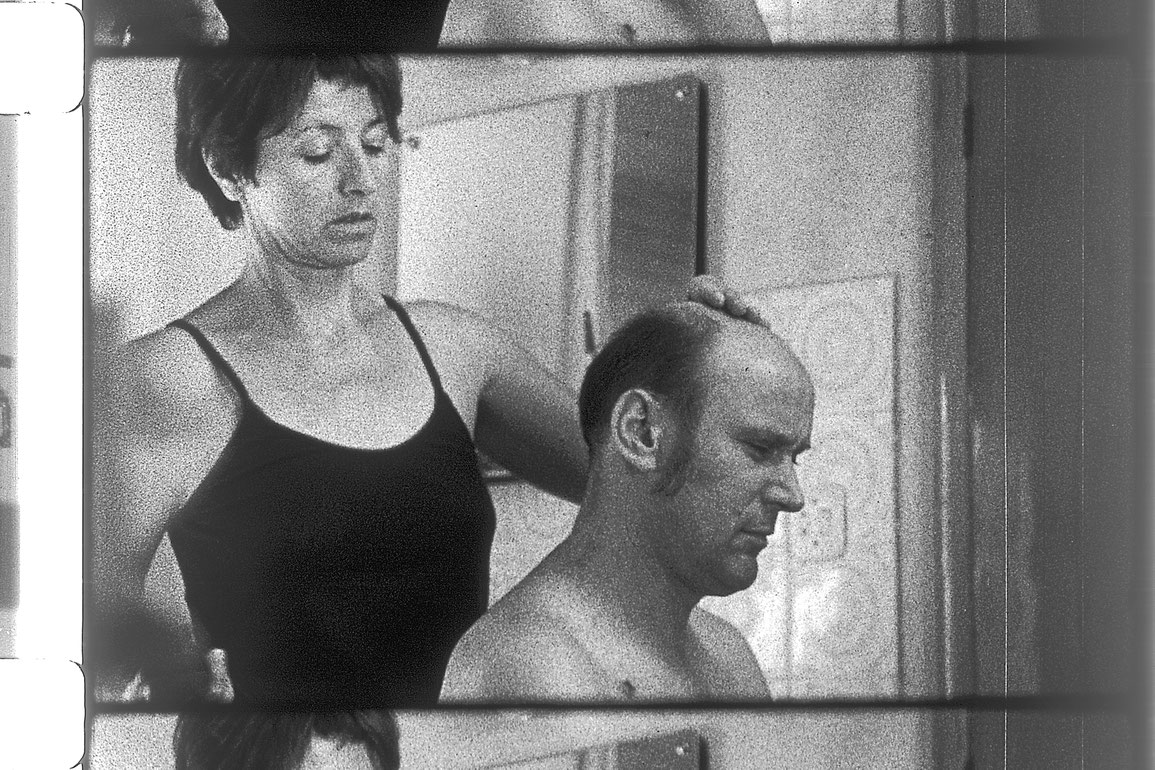Hotel Roccalba
Sunday afternoon in Hotel Roccalba: Is this an old-age-home, a recreational facility or simply a hotel?
(production note)
Where they are isn´t very important. What they´re doing isn´t either. The setting - a hotel that appears to be Italian, apparently situated at some altitude - is significant primarily because it provides conditions for an infectious mood. Twelve individuals are engrossed in their various (in)activities, and are only vaguely aware of their surroundings. Time is elastic, an atmosphere of dissipation, which the plot seems to pad in a strange way, spreads. Varied movement is present on the soundtrack only: a recording of Verdi´s Simon Boccanegra is being played on a turntable, countered by a broadcast of a soccer match coming from a radio. Josef Dabernig´s black-and-white film Hotel Roccalba has set itself up in an in-between space. The protagonists knit, fix a bicycle, read while lying down or standing, chop wood, sip espresso or put on makeup. One of them, Dabernig playing himself, is getting a haircut.
Precisely because everything appears to be so ordinary, there could be more here than meets the eye. While everyone´s actions are unconnected, they´re all coordinated, and would be half as meaningful in isolation. Things that happen outside situations and provoke actions, the interval in which things reveal their essence, has fascinated Dabernig in his previous works: This time the alternation between closely composed shots showing individuals and actions in isolation, and then larger ensembles, creates a group of solo operators. Hotel Roccalba consists of three scenes with hardly any interaction, though at the same time they´re dominated by tense concentration: a place where meanings enjoy their leisure.
(Dominik Kamalzadeh)
Translation: Steve Wilder
Hotel Roccalba, Texte Française
Et c'est précisément parce que tout cela semble tellement prosaïque qu'on se plaît à imaginer ce qui se cache derrière. Chacun agit de façon isolée, mais les actions s'interfèrent toutes et perdraient, prises séparément, une grande part de leur sens. Ce qui se produit en marge de situations, ce que provoquent les actes, l'interstice dans lequel les choses révèlent leur essence, voilà ce qui fascinait déjà Dabernig dans ses précédentes uvres. Cette fois, la succession de plans rigoureusement composés qui, montrant des personnes et des actions isolées, parvient néanmoins à créer des ensembles, génère un collectif de tueurs solitaires. Hotel Roccalba est constitué de trois scènes dans lesquelles les interactions sont rares, mais où règne un état d'attention détendue : un lieu où les significations s'adonnent au farniente.
(Dominik Kamalzadeh)
Traduction: Françoise Guiguet
Wavelengths Preview 2, Thursday, August 27, 2009 (Critique)
Hotel Roccalba is also relatively slight and offbeat, funny even, but the execution is so precise and Dabernig's cutting so angular and shocking that it feels right at home in Wavelengths. My favorite section of the film involves an elderly man and a put-upon bartender who wouldn't be out of place in Satantango. As in the opening sequence, Dabernig reveals their relationship gradually and in splintered fragments, cutting from a series of medium one-shots to a long-range, wide-angle shot that provides something like an objective perspective on them both. A note to cinema studies teachers: this would be a great piece for a unit on editing.
http://www.longpauses.com/blog/2009/08/wavelengths-preview-2.html
TIFF 09: WAVELENGTHS PREVIEW by Michael Sicinski (Critique)
Hotel Roccalba (Josef Dabernig, Austria)
Apparently over two years in the making (the artist displayed the script in a gallery exhibition in 2007, with suitably Structural / Conceptual directorial commentary), Hotel Roccalba is a small wonder, the sort of film that somehow manages to astonish with its precision while at the same time allow enough basic human breathing room to permit limitless discovery. The basic set-up: Dabernig had his family act as non-professional performers in a not-quite-ten-minute film in the run-down titular inn in the Italian Alps. Roccalba begins with quick bursts of human industry: an older gentleman (Dabernig, Sr., I believe) chopping wood in the yard next to two middle-aged women in lawn chairs working on some very rapid knitting. Over on the sidewalk by the building, a younger man tinkers with his upturned bike. Inside the rooms of the hotel, there is a haircut, the application of make-up, and a very standoffish bartender / drinker interaction. But what makes Hotel Roccalba so remarkable is Dabernig's unerring sense of composition, editing and blocking. At first, we don't know what we're seeing, so we don't realize that these scenes are staged. When that's the case, Dabernig exhibits a remarkable ability to break a single scene into multiple fragments, all within seconds. (One of the few contemporary filmmakers I can think of who works in this manner is José Luis Guerín.) The film is full of gentle misdirections; Dabernig's formal flourishes become a little trickier as the goings-on move from industry to torpor. But this isn't exactly right. What really defines Hotel Roccalba is a bizarre, thrilling sense of the disorganized, random stuff of life being invisibly, imperceptibly choreographed, a God-like aspect that is gradually revealed, becoming a kind of Cubist hysteria. The final shot is an overhead of an older woman (Dabernig's mom, I think), wandering from person to person, asking what they're doing. The film's parting shot, then: active, almost aggressive non-productivity. (Did I mention this is a comedy?)
http://www.theauteurs.com/notebook/posts/1005
Hotel Roccalba
2008
Austria
10 min



